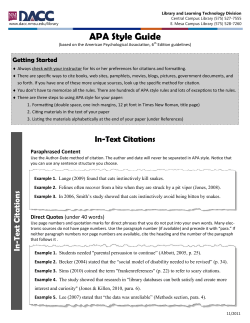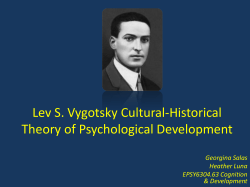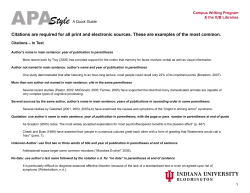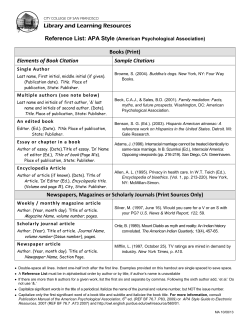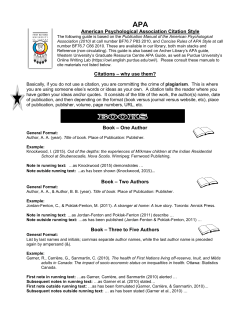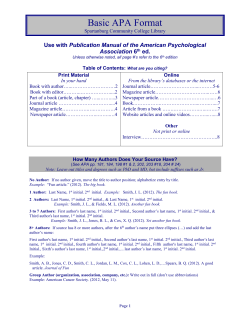
The Power of Board Games in Therapy
THE POWER OF GAMES IN THERAPY Jacqueline Archer, MSW Dana Cross, MSW Akeela, Inc. WHERE DID PLAY THERAPY START? Sigmund Freud 1909- “Little Hans” Hermine Hug-Hellmuth 1920 10 years later, Melanie Klein and Anna Freud TYPES OF THERAPIES Psychoanalytic Play Therapy Structured Play Therapies Relationship Therapies Behavior Therapies Group Therapy Sand Tray Therapy TECHNIQUES Directive Therapist may assume responsibility for guidance and interpretation. May ask the child to draw specific things or tell an exact story. Non-Directive “client-centered” Therapist may leave responsibility and direction to the child. May provide child with ample opportunities for artwork or story telling. WHY PLAY THERAPY? Association for Play Therapy, “the systematic use of a theoretical model to establish an interpersonal process wherein trained play therapists use the therapeutic powers of play to help clients prevent or resolve psychosocial difficulties and achieve optimal growth and development." WHY USE GAMES IN THE THERAPEUTIC SETTING WITH CHILDREN AND FAMILIES? Using the play-with-structure games is developmentally appropriate for preschool age and up children. Using the board-games, or games in general, can reveal the psychodynamic working of the child. Clinical examples have shown the parallels between dramatic play and board-game play. We can see both interpersonal and transference relationships, defensive needs and unconscious content during game play. CONTINUED… Therapists need to be sensitively aware of child development and where the child is: are they in the magical play of childhood phase, or are they in rule-oriented middle years phase. Understanding their development will help apply structure to using games in the therapeutic arena. WHAT CAN BE INITIATED/GAINED FROM BOARD-GAME PLAY? CHILDREN: Rapport Building It means they do not need to just sit there. It keeps you and your client busy so maybe they are more comfortable talking to you. Games have the same give and take that conversation is supposed to. How are they at multi-tasking. If the topic gets too intense for the child, you can shift the focus back to the game. Decision making/problem solving. It also puts everyone in the therapy on an even keel. Modeling/Social Skills Focusing on taking turns and having to do what is asked of the player can give a clue as to how a child takes redirection, or how they redirect others in play. How do they handle rules? You can get to know the client better. Are they good winners or good losers? Do they cheat to win? What are their strengths and weaknesses? Lastly, give a chance for the child to receive positive reinforcement FAMILIES: Games help the family relax and not think about the therapy as much. Can be used as a nonverbal assessment of the family. Can help to identify some of the family strengths and protective factors. Can observe the family’s weaknesses and their risk factors. CONTINUED… Playing games can help the therapist develop a treatment plan for the family that is based on how the family understands their own family system. It gives a glimpse into the possible dysfunction within the family system that triggers the identified client. Lastly, families need to know that playing games with their child(ren) can just be about having fun. PRACTICAL APPLICATION WITH GAMES Games Created by Companies Pros: Already put together, rules laid out, give instructions for the therapist as well as gives as outline as to how the game can be used in different ways Cons: Difficult to restructure, often focus on one area, costly! GAMES ON A BUDGET! GAMES ON A BUDGET Don’t Break the Ice! Can be used as an ice breaker in the beginning. Color coding stickers Each one represents a different topic Can have different color coding depending on the relationship with the client ~Pick Up Sticks~ Different colors, using to help with identifying emotions ~Sorry~ ~Jenga~ You can use color coding, or just write you question right on the blocks! ~Guess Who~ Either remove the current faces or just use the back. Use this this to assist with learning feelings and faces. You can ask: does your feeling have a smile? Does you feeling involve a frown? Connect Four For this game, one idea, place feeling stickers on each game piece. The one who connects four has to make up a story involving all those emotions! BOUNDARIES AND GUIDELINES WHILE USING GAMES Start general, as the therapeutic bond grows, move more specific Allow for passes Offer them a chance to not follow the rules/make up their own. Allow for different methods Let them know if you are really good at a game, give them a chance to “win” WHAT ARE SOME THINGS TO LOOK FOR? What game do they gravitate towards? What games do they avoid? What colors do they avoid, what questions are they most likely to “pass on” INTERACTIVE TIME! Try some of the games out, what do you think?? Ideas? Comments? How do/can you use this in your sessions? REFERENCES Creative Social Worker (2014, May 22). Using Games in Therapy. Retrieved from http://www.socialworkhelper.com/2014/05/22/using-games-in-therapy/ Gil, G. (1991). The Healing Power of Play. New York/London: The Guilford Press. Getz, Lindsey. (2011, May/June). The Power of Play Therapy. Social Worker Today, Vol. 11 No.3 P.20. Retrieved from http://www.socialworkertoday.com/archive/051711p20.shtml Hall, T.M., Kaduson, H.G., Schaefer, C.E. (2002). Fifteen Effective Play Therapy Techniques. Professional Psychology:Research and Practice, 2002, Vol. 33, No. 6, 515-522. Jonhsma, A.E., Peterson, L.M., & McInnis, W.P.(2006). The Child Psychotherapy Treatment Planner. T. J. Bruce (Ed.). Hoboken, New Jersey: John Wiley & Sons, Inc.. Levy, A.J. (2008). The Therapeutic Action of Play in the Psychodynamic Treatment of Children: A Critical Analysis. Clinical Social Work Journal, 36, 281-291. DOI: 10.1007/s10615-008-0148-2 Marks-Tarlow, T. (2012) The Play of Psychotherapy. American Journal of Play, 4(3), 352-390. Retrieved from: ProQuest Library Services. Nwokah, E., Hsu, H., & Gulker, H. (2013). The Use of Play Material in Early Intervention. The Dilemma of Perverty, 5(2). Retrieved from: ProQuest Library Services. Play Therapy (2013,April 26) The Power of Board Games in Therapy. Retrieved from http://buildingfamilycounseling.com/2013/04/board-games-in-therapy/ Raijmakers, M.E.J., Mandell, D.J., van Es, S.E., & Conihan, M. (2014). Children’s Strategy Use When Playing Strategic Games. Synthese, 191, 355-370. DOI: 10.1007/s11229-012-0212-x Stanley, Mercedes. (2014). Board Games and Family Therapy. Retrieved from http://utahplaytherapy.org/board-games-and-family-therapy/ Willis, A.B., Walters,L.H., & Crane, D.R. (2014) Assessing Play-Based Activities, Child Talk, and Single Session Outcome in Family Therapy with Young Children. Journal of Marital and Family Therapy, 40(3), 287-301. DOI: 10.1111/jmft.12048.
© Copyright 2025






